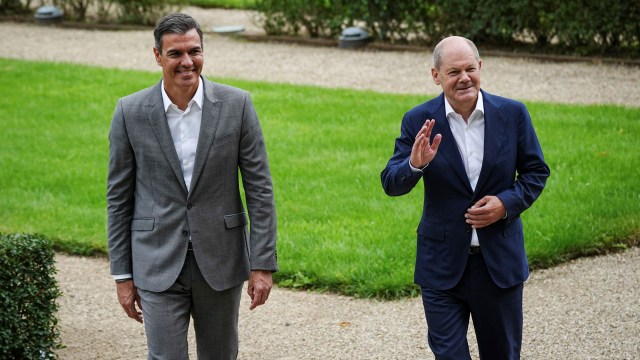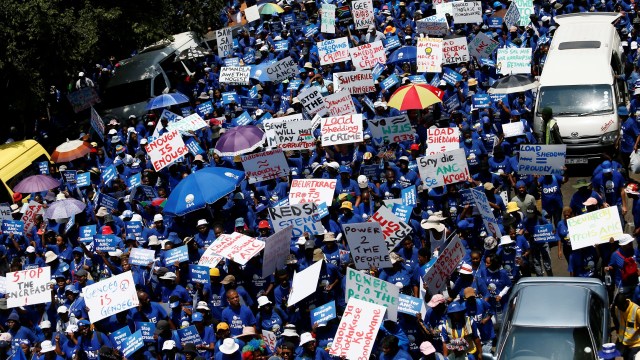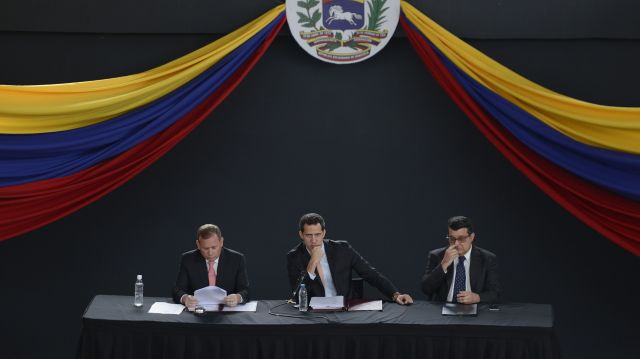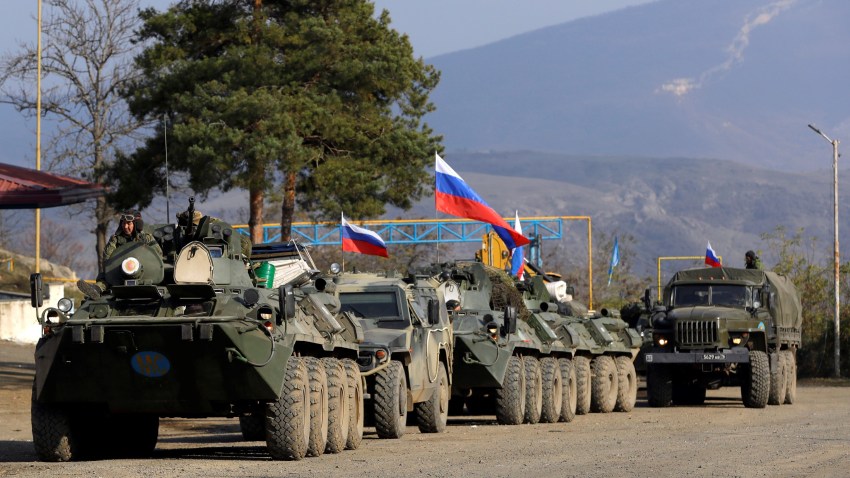Today at WPR, we’re covering recent successes for social democratic parties in Europe and South Africa’s now-united opposition.
But first, here’s our take on today’s top story:
Armenia-Azerbaijan: After two days of fighting, Armenian and Azerbaijani forces have reached a cease-fire agreement regarding the separatist Nagorno-Karabakh region. Talks between Azerbaijani officials and the region’s ethnic Armenian authorities on Nagorno-Karabakh’s reintegration into Azerbaijan are scheduled for tomorrow. (AP)
For context: This week’s fighting is the culmination of a 30-year conflict that dates back to the dissolution of the Soviet Union. For most of that time, Armenia occupied Nagorno-Karabakh—a separatist Armenian-majority region of Azerbaijan—as well as several blocks of Azerbaijani territory surrounding the region as buffer zones.
Over the past decade, however, the military balance of power as well as geopolitical dynamics have shifted in Azerbaijan’s favor, leading to the frozen conflict becoming hot for six weeks in 2020. In that short but violent war, Azerbaijani forces seized all of the Armenian-occupied territory surrounding Nagorno-Karabakh, but not the region itself, the final status of which was supposed to be resolved per the terms of a cease-fire agreed to at the time.
Negotiations since then have stalled, largely because the outcome since 2020 has seemed clear: Nagorno-Karabakh would return to Azerbaijan’s control. As a result, Baku had little incentive to make any concessions.
Our Take: Azerbaijan’s attack yesterday had raised concerns that Baku would achieve that outcome not through diplomacy, but through a bloody end game resulting in the ethnic cleansing of the Armenian population of Nagorno-Karabakh. Though an Armenian exodus from Nagorno-Karabakh is already underway, the tentative cease-fire reached today—which essentially represents a surrender on the part of Armenian forces in Nagorno-Karabakh—suggests that all sides are trying to avoid such a conclusion.
Get the Daily Review sent straight to your inbox every weekday.
Russia is bound by a mutual defense treaty with Armenia, and it has a peacekeeping force in Nagorno-Karabakh as part of the 2020 cease-fire agreement. Its troops have remained on the sidelines, however, with Moscow arguing that Azerbaijan has technically not attacked Armenian territory. But its inaction, as well as its shift toward accepting Azerbaijan’s preferred outcome, also reflect the fact that its influence and ability to shape outcomes in the region are now receding, in part due to being overstretched by its war in Ukraine.
Armenian PM Nikol Pashinyan, confronted by the reality of a clear imbalance in military power, has tried to prepare the Armenian public for the inevitable over the past year. But the protests that have erupted in Yerevan since yesterday underscore what a hot-button issue the region is in Armenian politics. Conceding Armenia’s inability to protect Nagorno-Karabakh will weaken Pashinyan politically, but will not necessarily jeopardize his position, given that he went on to win a snap election following Armenia’s territorial losses in 2020.
Now, as talks begin on Nagorno-Karabakh’s “reintegration” into Azerbaijan, negotiations will need to focus on three main priorities:
- Preventing any potential ethnic cleansing of the region’s Armenian population.
- Ensuring the fair treatment of the Armenian population under Azerbaijan’s rule.
- Avoiding any potential conflict with Iran related to Azerbaijan’s presence near Iran’s border with Armenia.


Europe’s Center-Left Can Learn a Lot From Scholz, Sanchez and Starmer
The final demise of social democracy has been predicted often, especially in Europe. In fact, the decline of so many social democratic parties in Europe has inspired a cottage industry of scholarship and analysis that purports to explain the strange death of the European center-left.
Yet recent electoral successes of social-democratic parties in Germany and Spain, along with the resurgence of the Labour Party in the U.K., all indicate the same thing: reports of social democracy’s death have been exaggerated.
As columnist Alexander Clarkson writes, all three cases also come with important lessons for other center-left parties elsewhere.
South Africa’s Opposition Needs More Than Unity to Defeat the ANC
In South Africa, the African National Congress, or ANC, has won a majority in every national election since the first democratic elections were held in 1994. Recently, though, the ANC’s popularity has taken a hit due to daily rolling electricity blackouts, endemic corruption, high unemployment and a stagnant economy.

Now, with less than a year to go until South Africa’s next national election, several opposition parties have joined forces, hammering out a preelection coalition agreement in an attempt to unseat the ANC. As Matthew Blackman writes, however, the success of the South African opposition will depend on more than simply uniting. It needs to offer a vision for the country’s future.

We want to hear your take on the issues we cover. We’ll select one person from those who answer the question below to receive a free month extension of their WPR subscription.
This week’s question: What should governments prioritize in their efforts to regulate social media? (See the On Our Radar item on the U.K.’s Online Safety Law for more context.)
- Limiting as much as possible the harms that such platforms might cause.
- Protecting as much as possible free speech rights.

On Tuesday, Britain passed a sweeping law designed to regulate online content. The Online Safety Bill, which took more than five years to develop, includes age-verification requirements for pornography sites and rules to reduce hate speech, harassment, online fraud and other illicit material.
Critics have argued that the bill does not do enough to protect users’ right to free expression and that it risks over-implementation. But after the first draft of the bill was published in 2021, Kate Jones wrote that “despite its criticisms, the bill is an overwhelmingly positive development.”

The U.K. Takes a Stab at Regulating Social Media Platforms
Aug. 24, 2021 | The Online Safety Bill presents an opportunity for the U.K. to demonstrate the strength of its independent regulatory approach. Read more.
U.N. human rights experts report that Venezuela’s government has intensified its efforts to curtail democratic freedoms ahead of next year’s election. They warned that political interference, including the use of threats, surveillance and harassment, has been on the rise and that multiple opposition candidates have been banned from taking part.
Political repression in Venezuela has meant that elections remain a longshot for change in the country. As Mark Feierstein wrote last year, however, they remain preferable to other options, and as a result, the U.S. and its allies should leverage sanctions to incentivize the Venezuelan regime to allow for a more competitive election.
Elections Are Still the Best Hope for Venezuela’s Opposition
Nov. 4, 2022 | The Biden administration should leverage U.S. sanctions to incentivize Maduro to allow for more competitive elections in Venezuela. Read more.

That’s all for today’s Daily Review. Coming up, we’re covering Russia’s dwindling influence in Southeast Asia and a recent tipping point in China’s trade with the United States.
Have a great day,
Jakob Cansler
More From WPR
- Mary Gallagher on “Common Prosperity” in China.
- Emil Avdaliani on Russia-Armenia relations.
- Jonathan Fenton-Harvey on a Nile dam dispute between Egypt and Ethiopia.
- James Bosworth on Brazil’s upcoming G-20 leadership.

